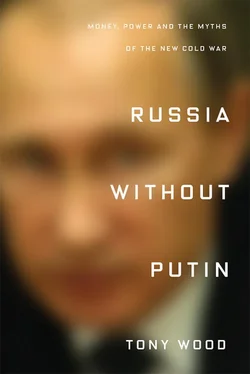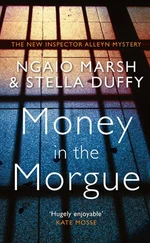Compounding these reductions in geopolitical influence and military weight, the 1990s also saw Russia slide down the global economic hierarchy – a shift made all the more pronounced by the simultaneous rise of China and East Asia, which rapidly overtook Russia as economic powers. At the start of the decade, the GDP of the Russian component of the USSR had been one and a half times that of China and almost double that of South Korea, but by 2000 stood at only 20 per cent and 46 per cent of each respectively. The figures relative to major economies over the same period were even worse: a drop from less than 10 per cent of US GDP to a mere 3 per cent, and from 17 per cent of Japan’s to 5 per cent. At the dawn of the new century, in absolute GDP terms Russia ranked lower than Brazil or India and only slightly higher than Turkey. {4} 4 Author’s calculations from World Bank data (World Development Indicators, retrieved 28 December 2016).
Post-Soviet Russia, then, though it was spared the total disintegration that other fallen empires have suffered – Austria-Hungary, for example – nonetheless lost much of what had made it a force of global stature. Moscow could no longer project power much beyond its borders. Its ideological reach was similarly circumscribed. Meanwhile, its economic position was disastrous and worsening relative to most of the world’s. Yet at the same time, it retained many of the attributes of a state much more powerful than it now was. It still had a UN Security Council seat and a vast nuclear arsenal. It had a large, if increasingly dilapidated, military-industrial complex, and the remains of a significant scientific-technical apparatus. Less tangible but also important were cultural factors: a language used extensively outside its new borders – including by a 20 million-strong ethnic Russian population that was now effectively a diaspora – and a literary and artistic patrimony of global renown.
The disparity between limited resources and lingering pretensions was the source of much confusion and frustration, the foundation for a great-power nostalgia that was often divorced from any real attachment to the Soviet system itself. Subjectively, many Russians – including a good portion of the policymaking elite – retained a superpower worldview, feeling the areas where the country’s strength had diminished as so many geopolitical phantom limbs. They had not yet become accustomed to the world they now inhabited, nor had they adjusted their thinking to the demands of an international system that was being forcefully reshaped by their former adversaries. From the very start of the post-Soviet era, a significant gap opened up between Russian assumptions and Western ambitions.
The diminution of Russia’s significance on the world stage coincided – not by chance – with the period of maximum alignment between the Kremlin and the West. An affinity with the West had begun to take root among the Russian intelligentsia and scattered members of the party–state apparatus as early as the 1960s. But it was only with Gorbachev’s rise to power that the ‘New Thinking’, as it was known, was installed as the guiding principle of Soviet foreign policy. {5} 5 On the emergence and rise of the ‘New Thinking’, see Robert English, Russia and the Idea of the West: Gorbachev, Intellectuals and the End of the Cold War , New York 2000.
Gorbachev went much further than détente , speaking in 1989 of building a ‘common European home’. He envisaged an ultimate integration of Russia and the Warsaw Pact countries into a harmonious bloc of broadly social-democratic states, a kind of Greater Scandinavia. Under Yeltsin, however, what had been an impulse toward convergence turned into a project to make Russia into a ‘normal’ liberal democracy, firmly under the tutelage of the US. If Gorbachev and his Politburo had stunned their Cold War interlocutors with the concessions they had been willing to make, Yeltsin’s government went still further, at times seeming to abdicate altogether from having policy goals of its own. In 1992, when asked by a visiting Richard Nixon what his country’s particular interests now were, Russian foreign minister Andrei Kozyrev could not identify any, and even asked Nixon to help him out with some suggestions. {6} 6 The encounter is described in Dimitri Simes, After the Collapse: Russia Seeks Its Place as a Great Power , New York 1999, p. 19.
The lurch toward the West was not only a matter of admiration for capitalism; it was rooted in a deeper set of prejudices and teleologies. Kozyrev spoke of Russia’s desire to join what he called the ‘community of civilized states’ – with the implication that the West itself was what constituted ‘civilization’ and that the non-West was backward, even barbaric. {7} 7 Andrei Kozyrev, ‘Russia: A Chance for Survival’, Foreign Affairs , vol. 71, no. 2, Spring 1992, p. 9.
This attitude was soon reflected in Russia’s policy stance, as Soviet-era ties to China, India and the Arab World were largely neglected. Still more crucially, Russian policymakers began to include in the non-West most of the former USSR – viewing those countries as burdens they fortunately no longer had to carry. In the summer of 1993, Russia unilaterally scuttled the rouble zone that had been agreed during the breakup of the USSR, sending the successor states scrambling to print new currencies even as Russia’s price deregulation made rouble inflation spiral. Moscow also raised new tariff barriers, which frayed still further what had already been a meagre lifeline for the other ex-Soviet territories. In the 1980s, Russia had accounted for around half or more of every other republic’s trade – almost three-quarters in the case of Ukraine. {8} 8 Tsygankov, Russia’s Foreign Policy , pp. 84, 86, Table 3.6.
The planned economy that had disintegrated in 1991 had been an interdependent whole, but now most of the USSR’s components were left with senseless fragments, which helped make the 1990s’ economic slump far deeper in these countries than in Russia. {9} 9 For a comparison of Russia’s economic fortunes with those of other former Soviet states, see Vladimir Popov, ‘Russia Redux?’, New Left Review 44, March–April 2007, especially Figure 2.
The Kremlin’s early turn away from the rest of the former USSR also accelerated a centrifugal dynamic among the ex-Soviet states themselves. For several of the republics, sovereignty had come as a surprise – the Central Asian states barely managing to squeeze in declarations of independence before the USSR fell apart. All the Soviet Union’s former components, apart from the Baltics, soon joined the ‘Commonwealth of Independent States’ created by Russia, Ukraine and Belarus in the 1991 Belovezha agreement that dissolved the Soviet Union. But although the CIS was, in Russian, actually called a soiuz – a ‘union’ as the USSR had been – it was from the outset intended to be a far looser form of association. Indeed, it was widely described even at the time as a mechanism for ‘civilized divorce’, in the words of Ukrainian president Leonid Kravchuk – a way to preserve appearances, perhaps, while living separate lives. {10} 10 Dmitri Furman, ‘SNG kak posledniaia forma rossiiskoi imperii’, in Igor Kliamkin, ed., Posle imperii , Moscow 2007.
Beneath the CIS’s forms, symbols and occasional pacts, what took place over the next few years was a process of regional disintegration, as each of the former Soviet states consolidated itself as a separate sovereign unit, the policy interests and trade links of each pulling in a different direction from the others. This development was all the more striking given the many basic commonalities between them, especially in the political realm. Across most of the post-Soviet space, ‘imitation democratic’ regimes similar to that of Yeltsin came to power – from Lukashenko’s in Belarus to Nazarbaev’s in Kazakhstan – and developed along comparable lines, each experiencing its own version of the conflict between president and parliament that Yeltsin resolved with tanks in 1993. {11} 11 Dmitri Furman was virtually alone in producing systematic comparative studies of all the post-Soviet regimes. Most of these remain unpublished in English, but for an overview see ‘Imitation Democracies’, New Left Review 54, November–December 2008.
Yet despite these parallels, the very fact of sovereignty seemed to create widening divergences between the ex-USSR’s parts.
Читать дальше












